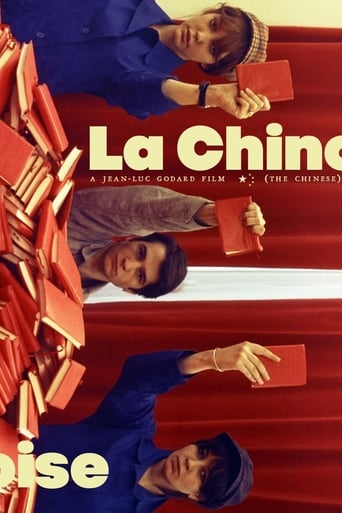tcorgat
Godard's La Chinoise is truly a remarkable and utterly unique film. This one and Week end are both the highlights of his progression from his earlier new wave, Hollywood inspired films, to more experimental and avant-garde ones. For those interested in good stories and plot this one will be a bore. For those that are also interested in good directing, camera shots, angles, long takes, brilliant cinematography (man the red colours), minimalism, cool editing of both sound and picture, La Chinoise is exactly what they want.It's very important to be familiar with the time period (late sixties), in both culture and politics. And of course, with communism, especially Maoism. Now some people may think of this film as an "ode to communism", while others may say that it's more like tongue-in-cheek. Whatever it may be, the film is simply brilliant.What we have is bunch of young people in an apartment, reading books, quoting Mao, having discussions, presentations and witty dialogue, about loads of subjects such as: Love, Vietnam war, Communism, capitalism, language, terrorism, knowledge, etc. That is the whole plot of the film, but the film language here is much more deep and rich, as mentioned before.My rating is pure 10/10.
Martin Teller
I will give Godard due credit for his filmmaking skill and innovation. This movie, like most of his, is marked by a playful sense of humor, unusual editing technique, and a bold palette of primary colors. But good lord, the rhetoric. Perhaps more than in any other of his films, he has people doing that thing which drives up the goddamn wall: reading straight from a book. In this case, mostly Mao's little red book. If you like people constantly spewing didactic slogans at you in a monotone voice, this is the movie for you. The best part is that Godard appears to be poking fun at these young, bourgeois Marxists. It seems like Anne Wiazemsky's character wants to become a revolutionary terrorist just to get out of going to class. But this is also the worst part, because I view Godard as on par with them. He's a wealthy, privileged white guy playing Commie, sneering at everyone else. "Look at how clueless THESE little hypocrites are, but I'M the real deal." Phooey.
treywillwest
I've heard some claim this as Godard's seminal work. I wouldn't say quite that, but its a great, and I think misunderstood, piece of work. Everyone discusses this film as if it were a critique of the May '68 Movement, forgetting that it was released the year before, and probably filmed two years before. Everyone thus views it as a satire of the past, when it fact it is a frightened critique of the contemporary. Godard does indeed think the "Maoists" the film follows are dilettantes, as the May '68 Movement proved to be, primarily, composed of. But he also wants desperately for a more militant presence to assert itself, and lead the contemporary situation into a more legitimately revolutionary direction. The seminal scene of the film is in the last act, when the student radical meets with her professor "radical" on a train. Both sides issue futile maxims. Godard overlays the words "this situation must change!" over their conversation. The pseudo-revolution of the 1960s, Godard prays, can become a real one. In retrospect, this is somber
bobsgrock
This is more of a history and social lesson than a film and perhaps that is what Godard intended. There is no real plot or narrative to speak of, but rather various scenes showing a group of French students in their lair of socialism and Communism as they discuss and digest the many teachings and ideas from Lenin, Stalin, Mao and Marx. One thing I still don't understand about Godard is if he is advocating these beliefs or against them. Still, the film is very well-made with the primary actors giving very believable performances and Godard still messing with the basic fundamentals of film making. There is one great scene that is an unbroken shot of what must be at least 7 or 8 minutes in length. It takes place on a train passing through Paris and shows Anne Wiazmesky talking to a French politician about the cons and pros of revolution and violence. It is interesting to listen to as well as watch. This film is the same way and so is this director, though certainly not for everyone.




